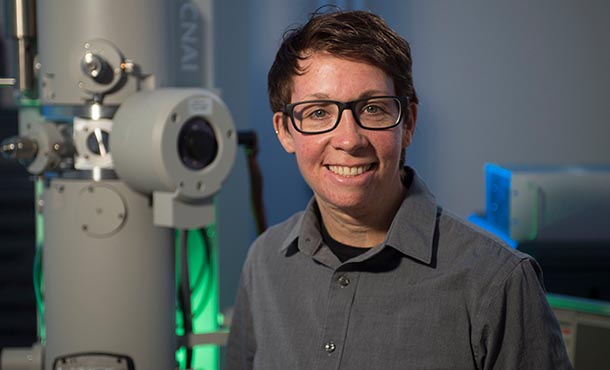
Deborah Kelly, Huck Chair in Molecular Biophysics and professor of biomedical engineering, was recently elected president of the Microscopy Society of America. IMAGE: DEBORAH KELLY/PENN STATE
Engineering professor named Microscopy Society of America president-elect
1/8/2021
By Ashley J. WennersHerron
UNIVERSITY PARK, Pa. — Deborah Kelly, Huck Chair in Molecular Biophysics and professor of biomedical engineering at Penn State, was elected president of the Microscopy Society of America (MSA). Her three-year commitment as first president-elect, then president, then past president, began in January.
“I am honored to be elected president of MSA,” said Kelly, who has been a member since her post-doctorate training and throughout her academic career. “The society provides a fantastic platform to exchange ideas and collaborate as we continue to advance not only the capabilities of our tools, but also what we can understand from what they show us.”
Established in 1942, MSA initially focused on electron microscopes, but soon expanded to include applications of microscopic technologies rather than just the development of tools. According to the society’s website, MSA supports “the promotion and advancement of techniques and applications of microscopy and microanalysis in all relevant scientific disciplines.”
Kelly, who also directs the Penn State Center for Structural Oncology, develops and improves advanced imaging techniques to better study molecular mechanisms in life-sustaining processes. Since joining Penn State in 2019, she led the team that unveiled the first structural glimpse of p53, the protein that can give rise to breast, brain and pancreatic cancers, among others.
“The first step in understanding a problem in life sciences or materials research is seeing it,” Kelly said, noting that her team regularly uses many of the electron microscopes housed in the Millennium Science Complex. “We use microscopic tools to see small things in a big way.”
She has partnered with cancer biologists, virologists and members of industry to invent and adapt new technology to better image and understand cancer proteins, viruses and early cell development. Kelly explained how she uses and adapts cryo-electron microscopy in her research in The Symbiotic Podcast, produced by Penn State’s Huck Institutes of the Life Sciences.
“The society provides the invaluable resource of other scientists,” Kelly said. “The shared tool of microscopy brings together researchers from drastically different fields. Our varied views can help focus individual research goals, while still prepping the stage for unique collaborations.”
Kelly previously served as a director of biological sciences for MSA, working with the executive council to develop an outreach program to engage with early career scientists and to support new diversity and inclusion efforts.
“Dr. Kelly has a deep commitment to furthering microscopy and all the insights it can bring to so many disciplines,” said Cheng Dong, professor and head of the Department of Biomedical Engineering. “She knows that bringing people with varied experiences and different perspectives to the table provides the best chance for all of us to advance the field and see even more.”
As president, Kelly plans to continue to elevate the society’s mission through social media engagement and cross-pollination efforts with other national societies. She will also work to attract and retain more underrepresented scientists to MSA, including people with racial and ethnic minority backgrounds, women and gender non-binary individuals.
“MSA is very inclusive, and we’ve grown — and will continue to grow — across multiple disciplines for any and all microscopy enthusiasts,” Kelly said. “I plan to continue working to engage young scientists from diverse backgrounds who bring such zeal to the field. Their curiosity flourishes under the MSA mentorship program, and it’s especially fun to see their excitement when they present their own work at our annual meeting.”
The society’s annual meeting, Microscopy & Microanalysis, which will be held this year in Pittsburgh on Aug. 1-5, is always preceded by a student congress. Students gather to share their work and professionally network in preparation of the meeting’s poster sessions, talks and workshops.



